What Are Keywords?
Our audience are smart people. Many of them code, many of them write, most work online and make good salaries, and in some capacity probably use the word “content” every day.
But they’re not marketers. They’re not SEO specialists.
If you’re in this audience, I’m certain this isn’t the first time you’ve heard the word “keyword”.
Keyword this. Keyword that. Long-Tail. Short-Tail. Semantic Keywords. Keyword Intent. Blah blah blah. ????

The easiest way to define a keyword is “the search query typed into Google”. It’s what someone types in and clicks “search” for. It doesn’t matter if it’s one word or if it’s an entire sentence. If it’s something people search for, it’s a keyword.
For example, take the search “Jeff Bezos” — that’s one keyword, not two.
Google is smart enough to know that if someone types that in, what the searcher is looking for is Jeff Bezos, the rich guy from Amazon.com.
If that search pulled back two separate keywords, Google’s logic would be to pull half their results for simply the word “Jeff” and the other half for the word “Bezos”. Rather than getting rocket ship news, you might get a response for “whatever happened to Jeff Foxworthy?” or “did you mean Bozos the clown?”
Now take the search “Jeff Bezos with hair” – Yup, that’s a keyword too. 4 words long, but still one keyword.

In each of these instances, Google analyzes the search (no matter the length), puts the words together into context, and delivers what they think you were looking to find.
SEO as a concept is simply telling Google what a particular page on your site is about so that when someone searches for that keyword they will know to pull you up for it.
The way that Google knows your post or page satisfies that search? They “crawl” through it and take note of the amount (and prominence) of relevant keywords throughout it.
If your post or page has a ton of related keywords throughout it that match, or are adjacent to what the searcher just typed in, they’ll understand “hey, this page must be about that!”
There’s a lot more to it than this, but that’s the gist.
For more details be sure to take our Free SEO Course
The Four Most Important Terms in Keyword Research
In general, there are four very important terms content marketers need to understand when it comes to Keyword Research.
- Short-Tail Keywords
- Long-Tail Keywords
- Informational intent Keywords
- Commercial intent Keywords
Learn these and you’ll be able to match wits with even your most nerdy content friends.
1. Short-Tail Keywords
Remember how I said that no matter the length of the search it’s still just a single keyword? That’s true, however, the number of words within the keyword still matters.
In general, short-tail keywords are searches that are three words or less.
These are the terms that
- Get searched the most
- Are difficult to interpret the user intent for
- Are nearly impossible to rank on the first page for
If there’s one thing I’ve learned in seven years of content marketing — most people are bad at searching for things.
That might surprise you if you’re an above-average internet user, but remember, there are a lot of people out there. Most of them are NOT above-average internet users.
I say this not anecdotally, but speaking from sheer numbers.
Look at how many times the word “shoes” gets searched on average every single month:
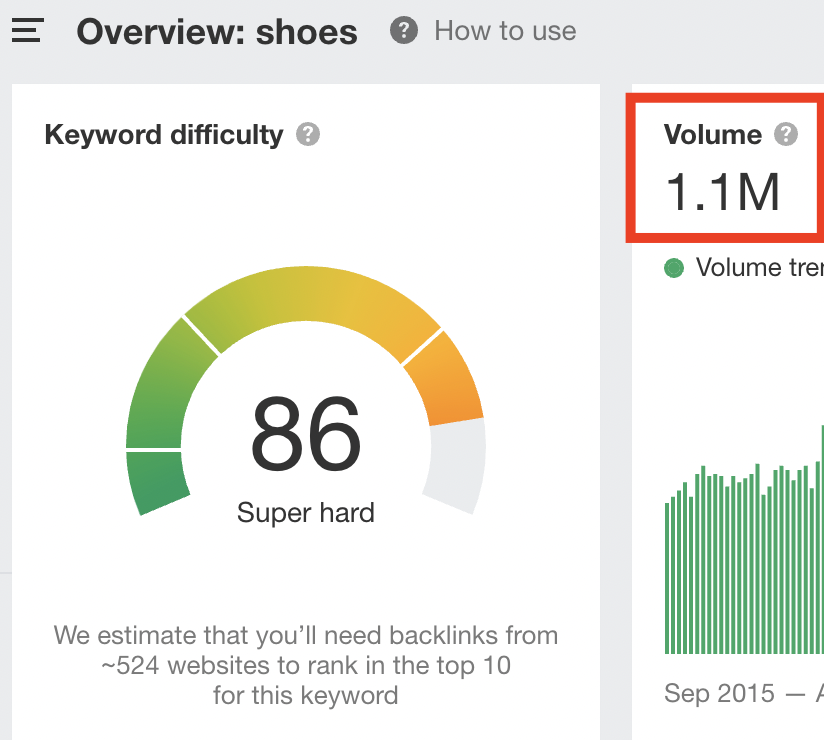
1.1 MILLION times.
Every single month someone in the United States alone simply types in the word “shoes” and hits search.
If this doesn’t make you groan and facepalm about the state of society, nothing will.
What is Google supposed to do with searches like these?!
What in the world could somebody want to find when they type simply the word “shoes”?
Do they expect to see…
- Men’s shoes? Women’s shoes?
- Pictures of shoes?
- Articles explaining different shoes for different occasions?
- The history of shoes?
- An op-ed about the time Obama wore tan sneakers?
Are they shopping? If so, what shoe site are they hoping to find?
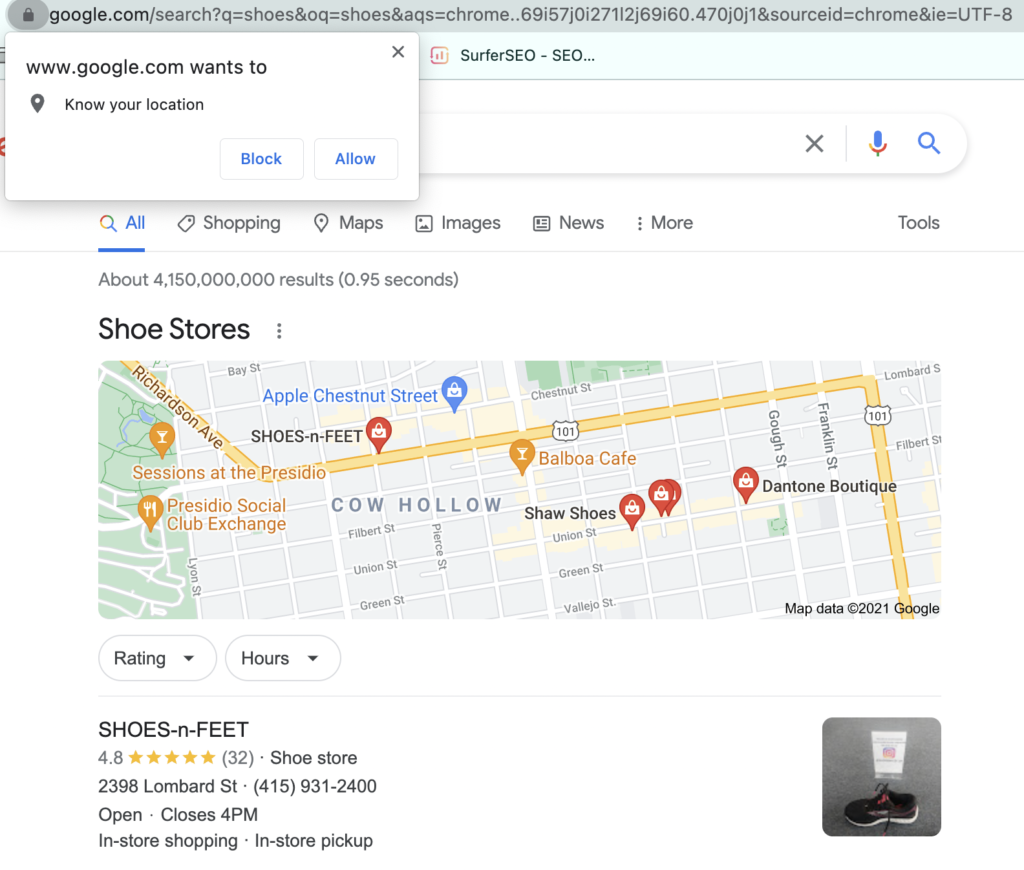
In this case, Google asks me to allow my location in order to show me shoe stores near me.
I’m currently traveling through San Francisco, and am staying near a store called “Shoes N Feet” — I hope they really sell feet.
But if we scroll down beyond that top result — look at how all-over-the-place the rest of the results are.
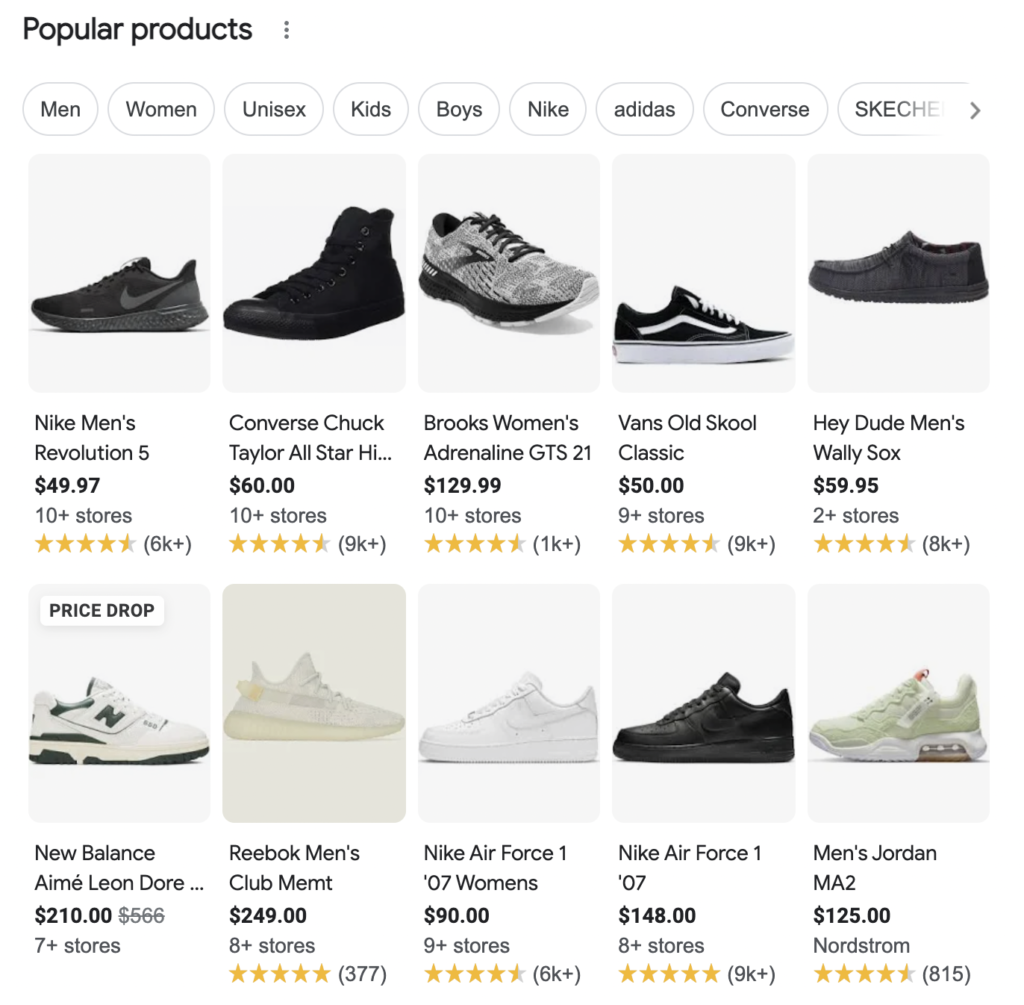
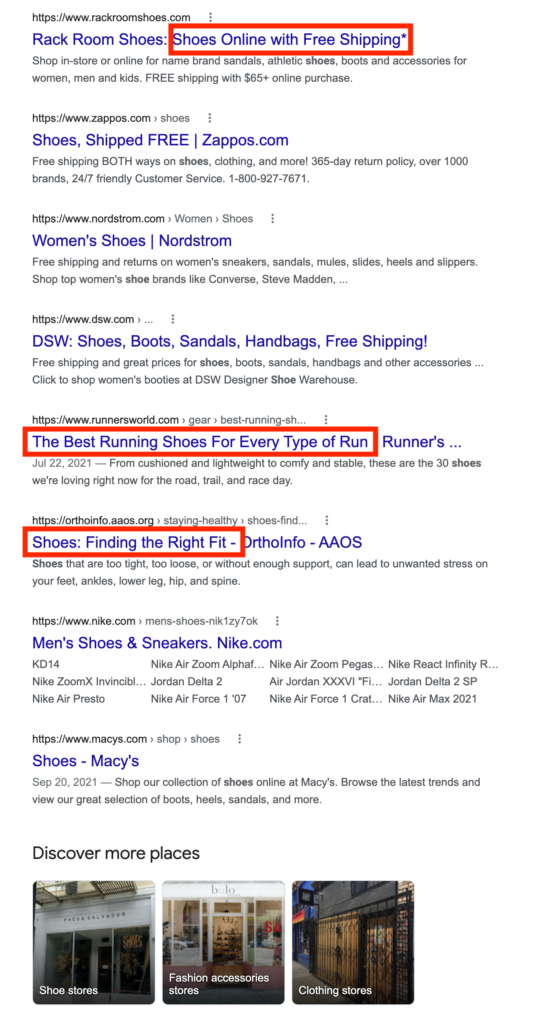
Google is doing an admirable job of guessing what a user could be wanting when they simply type in the word “shoes” when they are in a particular location.
The neighborhood in San Francisco I’m in is known to be wealthy and health-conscious — they know my IP address because I clicked “allow”. Maybe that indicates why I’m getting athletic shoe results rather than sandals. (If you’re in a beachy area, you should try this. I’ll be curious about what you find.)
Even with that insight, though… they’re still just throwing darts.
In this example, they pull up shoe stores near me, places to buy shoes online, a page entitled “women’s shoes”, and articles about both “the best running shoes for every type of run” and “how to find the right fit”.
It’s obvious they have no clue what I could possibly be wanting here. After all, how could they? I just basically yelled the word “SHOES!” and hoped they would read my mind.
The fewer the words in the search, the more broad the results will be, the more times it will be searched, and the more difficult it will be to rank on page 1
Because there are so many different results that can theoretically be shown, there are always millions of pages to compete with, including those by big-name companies with infinite dollars and savvy marketing teams.
Short-tail keywords are not valuable to try and rank for. You’ll almost never succeed.
If you’re the type of client who says to your marketing agency, “I want to rank number one whenever anyone searches the word Shoes”… I want you to take a long hard look at yourself in the mirror and think about what you’re asking.
Unless you’re already a corporate giant, ranking for high-volume short-tail keywords is almost impossible.
2. Long-Tail Keywords
Long-tail keywords, on the other hand, are content marketing gold.
The more words in a search, the easier it is to understand what the user is looking to find. And because it’s more specific, there’s a lot less competition. When there’s a lot less competition, you’ll rank a lot faster.
Take a look at the search data for the 5-word keyword “Adidas running shoes for women”.
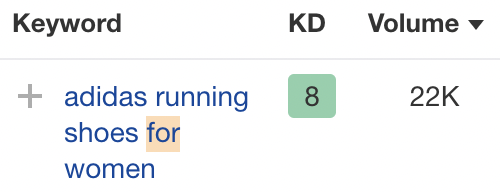
22,000 average monthly searches and a low difficulty score of 8 (out of 100. The higher the number, the more difficult it is to rank on page 1).
Also, look at how specific the search results page is. Because there were more words in the search, there was more context for Google to understand what I was wanting to find. Every single result on this page is specifically about, well, Adidas running shoes for women.
Makes sense, doesn’t it?
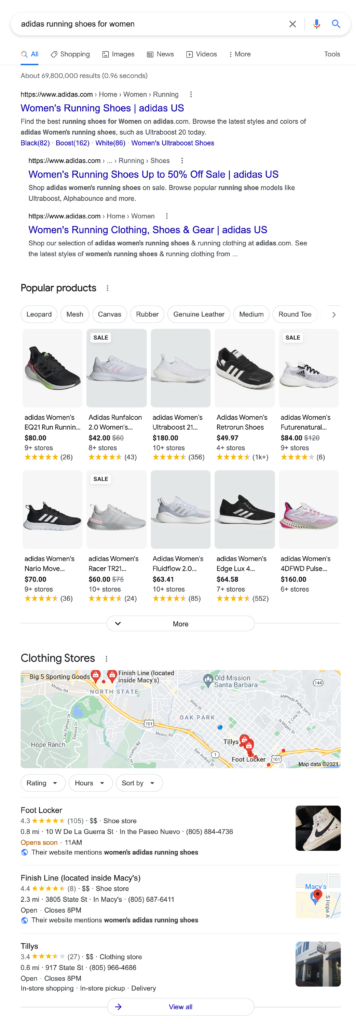
In contrast with short-tail keywords, long-tail keywords are searches with 4 or more terms. In general, these terms get searched less often, are easier to rank for, and are better at determining the searcher’s intent.
For 99% of us, long-tail keywords are the better terms to aim for as part of a content strategy.
Even if you target long-tail keywords that don’t have a high search volume, it greatly benefits you to cover and create topic clusters from many different angles and perspectives.
Something Google has begun to take extremely seriously is the “Experience, Expertise, Authority, and Trust” ranking factor (also known as E-E-A-T). Rather than giving a platform to anybody who wanted to write an article, they’ve decided it is best to give its users the advice of true experts whenever possible.
A great way of looking at it is to ask, “when have you ever known a true expert to talk about a subject just once?“

If your niche is shoes, aim to target long-tail keywords that target long-tail keywords in your niche. It establishes your expertise in Google’s eyes and gives you a valuable, data-driven perspective on exactly what you’re writing about.
By having lots of content on one specific subject, it shows to Google what an expert you must be on the subject. That means when there IS an opportunity to be ranked highly? It’ll know you’re the expert deserving of being there when it really matters.
In the shoe niche and need a place to start? All of these long-tail terms are easy to rank for. Go ahead and consider these your first seven articles. Be sure to internally link to your most important pages.
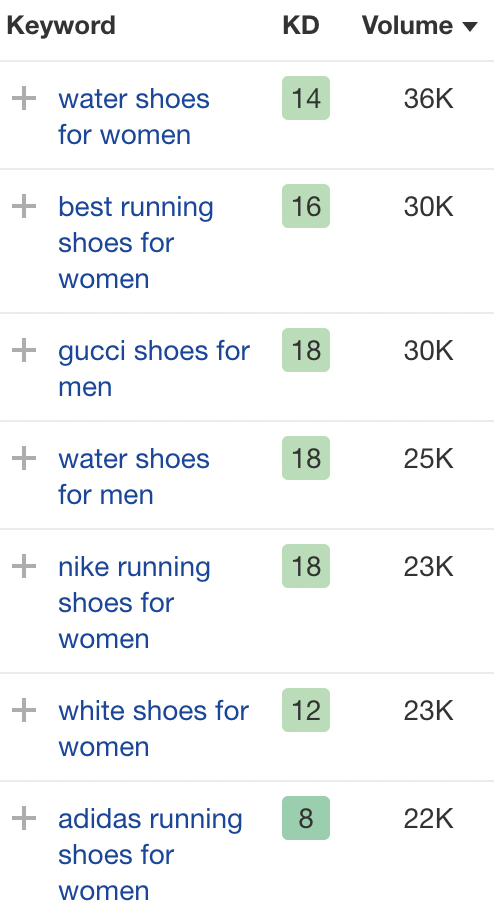
A Note on Marketing Funnels
If you’ve ever received an email from a creator, you’re in their marketing funnel. Even if their emails don’t seem suspect, they’re 100% trying to sell you something (or they soon will be). That’s how it works. They offer you advice, knowledge, insight, whatever they can in order to build trust with you, then, eventually they’ll hit you with an offer.
It’s not malicious. Most of these creators genuinely want to help. And the knowledge economy is reasonable. If they’ve spent 10 years getting good at something and can package that knowledge into short, easy-to-follow lessons? Of course somebody will see the value in expediting that learning in exchange for money.

This funnel methodology works its way all across the internet. From big businesses to small, nearly every single article you’ve ever come across was not created out of the goodness of their hearts, but with a strategic purpose — to get in front of you.
What do people turn to Google for? Answers. The way businesses get in front of them? Write those answers.
Once potential customers end up on your site, the goal is to be sure they see your logo, understand your name, what you can offer them, and create top-of-mind brand awareness. The more they see your name, the more they’ll associate you with a particular solution.
Think they’re going to leave without ever engaging? Offer them a free download in exchange for their email address and nurture their business slowly via their inbox.
If you understand internet marketing funnels well, this probably already makes sense to you.
What not everyone understands, however?
The search itself often indicates what stage of a funnel that person is in.
3. Informational Intent Keywords
More often than not, the pages that get discovered the most online are “informational” in intent. What this means is that the person who typed in the search was simply trying to solve a problem they were having. They weren’t trying to purchase something or even considering doing so in the future — they simply wanted information.
By creating and optimizing posts that provide solutions to these Informational intent Keywords, businesses rank on Google and become discovered, often by thousands of new people every single month and giving you the best chance to succeed in SEO.
Sure, most of those eyeballs don’t “convert” into business, but if 100,000 eyeballs found your site each month and 2% of them did? That’s 2,000 additional leads that found their way into your recurring revenue stream. ????
Furthermore, that’s 100,000 more chances each month of someone sharing your article on their social media, with a friend, etc. Word spreads fast when you create useful content.
Targeting informational intent Keywords serve one purpose: to find new business leads and introduce someone to your funnel.
If you ever hear a marketer using words like TOFU, MOFU, or BOFU, that’s what those acronyms mean — Top of Funnel, Middle of Funnel, and Bottom of Funnel.
Informational intent keywords can be either long-tail or short-tail, and they oftentimes include modifier words like why, how, best, top, ways to, etc.
I overuse this image, but it does a great job of illustrating the keyword funnel process. Notice TOFU (top of funnel = informational intent) while the bottom of funnel = commercial intent.
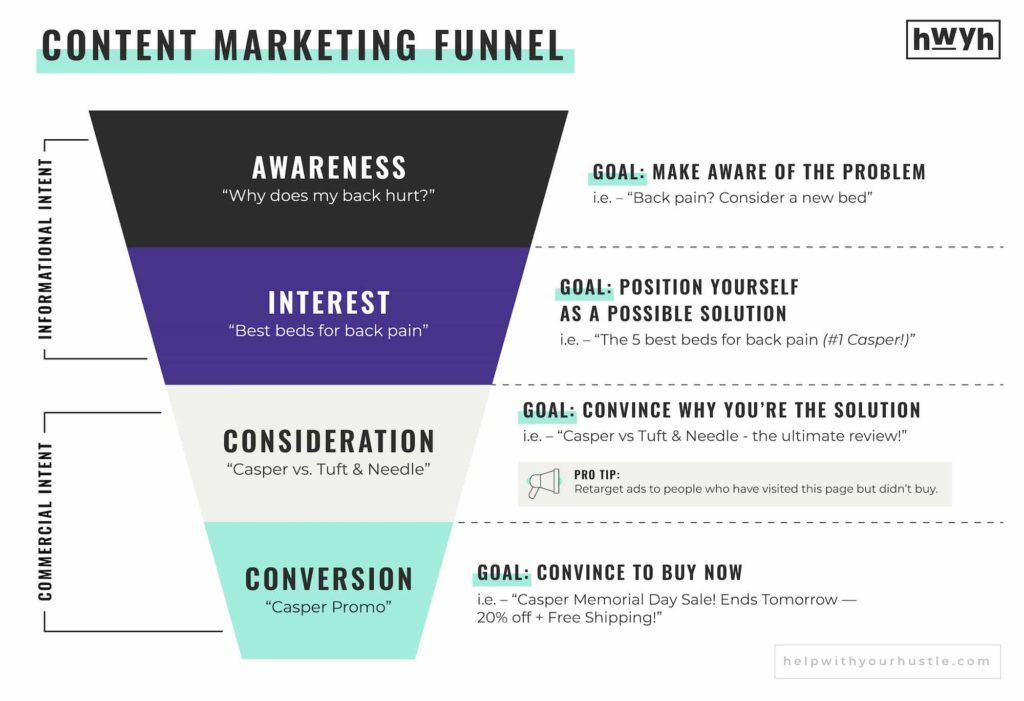
The Top of Funnel TOFU keywords will almost always be informational in intent. Remember, these are people who are not looking to spend money.
Your goal with these is simply to get in front of them, make sure they know you exist, and advance them downward to the next phase in the funnel…to get them interested in your solution so their future searches will begin to include commercial intent Keywords.
4. Commercial-Intent Keywords
Commercial intent keywords almost always get searched less, but they serve a very important, very specific function in a marketing funnel — they indicate a potential buyer. The people who perform these searches are considering spending money on something. This means that if you do a good enough job targeting them, you might have a chance at convincing them to spend that money on you.

Think about your own online spending behavior. If you’re trying to fix something around your house, you might search “how to fix X”.
(That’s a Top of Funnel informational search, btw).
If you find an article that promises to teach you how to fix it and they suggest you need a specific tool for the job, you might then have to search “best Y for fixing X”.
Then the top results of THAT search will likely suggest a few of the best ones at differing price points.
Notice how your “intent” has shifted from simply looking for information to actually thinking about spending money?
At this point, you have narrowed down your solution and learned that it requires a purchase. You’ve just shifted into commercial intent territory.
A smart marketer trying to sell that tool would certainly be trying to write articles saying that their product is the absolute best solution for people with your specific needs as someone whose search included a commercial intent keyword.
Continuing with this example, now say you’ve narrowed your options down to two competitors. Tool A and Tool B.
Think you might type in the search “Tool A vs Tool B” and hit send? Or maybe you’d search “Tool A Reviews” or “Tool B Free Shipping”.
Commercial intent Keywords often use modifiers like Vs, Review, Pros, Cons, free shipping, or promo.
If you find these terms alongside terms that your product or service may be a solution to, you absolutely should consider creating content around it and meeting your potential clientele no matter what step of the buyer’s journey they are in.
So Then What Is Keyword Research?
The natural next question might then be, “how do you actually find these magical terms?”
That’s where the art of keyword research comes into play. We in the Keyword biz lovingly refer to the practice as “The First Step in SEO”. Without it, you’re throwing darts blindfolded and hoping for the best.
Without keyword research, you don’t have a content strategy. You’re not using data to drive your decisions, and that’s risky.
Keyword research involves using sophisticated (usually expensive) tools to find, analyze, and interpret Google search data to make smart decisions about what to optimize your website and its content around. The goal is to find article opportunities that your clients want to read.
It allows you to discover what terms real people are actually searching for, how often those terms get searched, and how well other websites are currently meeting the market’s demand.
It allows you to discover good opportunities and, perhaps more importantly, identify bad ones before you waste your time.
It’s because of Keyword Research that I can say with confidence that this very article doesn’t stand a chance at ranking on the first page of Google.
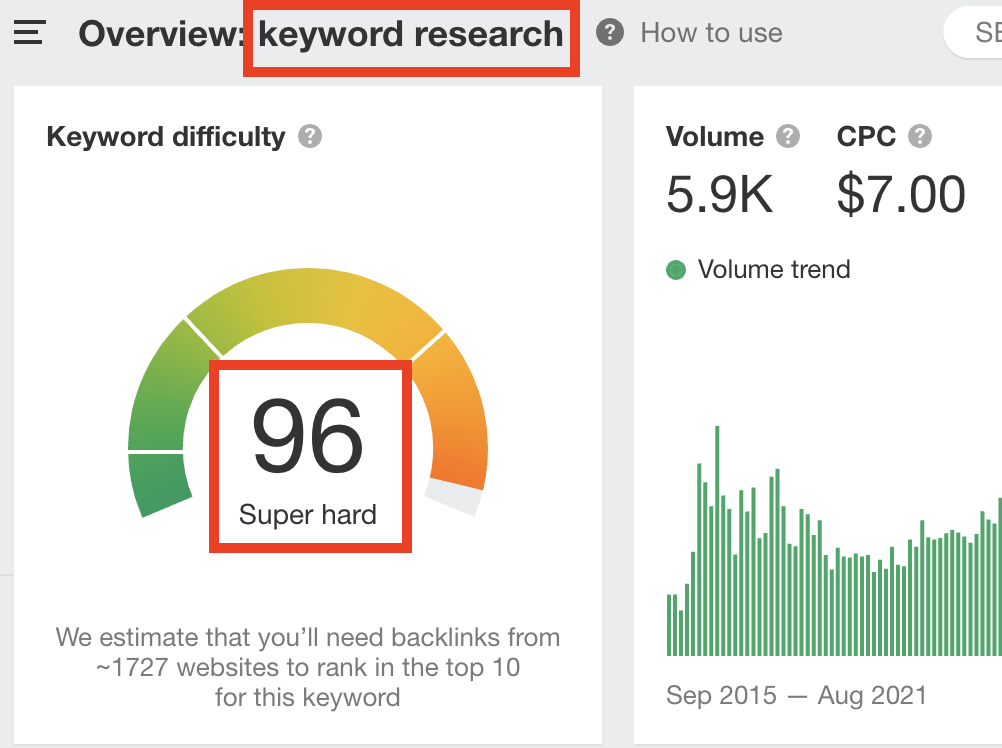
In this instance — yes, I’m going against conventional wisdom. I knew in advance there was a high likelihood that this article will never rank. Our preliminary Keyword Research tells me this, however, I’ve still chosen to write this article anyway because it serves my potential clients.
I’m aware they may never find this via a Google search. My hope is that they’ll share it amongst their peers, or that someone who discovers our site another way will be drawn to it for its utility.
Rest assured there are (and will continue to be) more articles across our website that target less challenging terms.
Pros of Investing in SEO
That said… businesses’ oftentimes ARE foolish, and they DO often ignore optimizing their site for keywords.
You know how I can tell? I’ve audited literally hundreds of websites in my career. I do this almost every day, oftentimes just out of curiosity (I’m obviously very fun at parties.)
10 times out of 10, when I audit a site with lots of content and not a lot of traffic, it’s very obvious to me that they’ve just been writing for the sake of writing, or growing their audience elsewhere.
Many of our favorite, most wealthy thought leaders have established their reputations on social media, podcasts, and youtube channels rather than via their websites.
If that’s the avenue you’d prefer to pursue, by all means, go for it.
Many of us do not wish to be public influencers or niche celebrities, however. Many of us simply want to write, share, connect and earn.
There’s more than one way to earn an online dollar.
We’d argue that for every profitable influencer out there, there are 100 websites making at least 10x as much money by leveraging the written word, Google, Bing, and SEO.
For every business celebrity like Tim Ferris in the world, there are a hundred oft-used but barely recognized websites like Flaticon.com.
Of those two, which brand’s website do you think is worth more money?

I’m sure that Mr. Ferris brings in plenty in other areas of his life, but purely from his website alone? His site’s organic traffic can’t even come close.

Keyword Research is a vital investment in SEO, and SEO can be incredibly lucrative if prioritized. Does it have to be the main part of your brand’s strategy? Not necessarily. But if you want it to be, it’s imperative to be targeting keywords. Otherwise, you’re wasting time and effort.
How to Earn Money With SEO
One of my favorite ways that sites with lots of traffic earn money? Ads. Not the crappy pop-up ones, but tasteful, strategic, partnerships with like-minded companies you’d actually want to be associated with.
Say you had a page that drove 100,000 monthly views to it and it was all about how to make at-home espresso.
Think you couldn’t get in touch with a company in that niche (maybe a home espresso machine manufacturer or alternative milk distributor), then tell them you’d love to sell them a premium sidebar placement for $5k per month?
There are companies out there with hundreds of thousands in monthly marketing budgets who would be thrilled for the opportunity.
I’ve seen these kinds of conversations happen, and it’s a remarkably easy sell. With a site like that, your only concerns would then be, “who do you want to partner with and how much do you want to charge them?”
Cons of Investing in SEO
Investing in your site’s SEO (to many, including myself) seems like a no-brainer.
If you like to write and are capable of putting out regular content… why wouldn’t you want Google to bring thousands of people to it?
Here are a few arguments you should consider in the long term.
Argument 1: SEO Can Cheapen Your Brand
Anecdotally, have you ever noticed that when you Google something – for example, say you’re looking to buy a new camera, and all of the top articles feel the same?
“The Top 10 Cameras for “X” or “Don’t Make These 5 Mistakes When Buying a New Camera!”
Then you read the articles and they all just look like rehashed versions of one another.
If you’re anything like me, those articles don’t really help. They might get your attention on some great cameras, sure, but you begin to wonder, “are these just advertisements?”, “can I trust this source?”

There’s a reason 88% of people prefer word of mouth recommendations and it’s no different when it comes to online research.
Yes, those uninspired articles DO work to drive lots of traffic to your site (that’s why they keep writing them), but if you’re an aspiring thought leader who wants people to authoritatively trust you, filling your site with uninspired self-centered content might make you seem less trustworthy.
It’s, for this reason, you don’t see the big-name influencers out there writing top 10 listicles or clickbait headlines.
It’s for this reason that so many influencers earn hundreds of thousands in ebook and course revenue despite the fact that their websites don’t actually drive very much traffic from Google at all.
What this decision comes down to is, what is your goal with your website?
Do you want to play a part in building a branded content machine that drives hundreds of thousands of visits to your website every month?
Or do you want to be a recognizable and trusted social media influencer whose face your entire niche recognizes?
For many people, there’s a lot of value in earning money anonymously and not having to worry about being in the public eye.
It’s two different sides of the same coin. Just choose which strategy works best for you.
Argument 2: SEO Is Always Changing
The other argument against going the SEO route is that you’re at the mercy of Google’s algorithm, and while something works very well now — it may not always be that way.
Remember, Google’s priority is always going to be their own self-interests. What their self-interests are tied to is people trusting Google.
It’s for that reason they’ve continually put out algorithm change after algorithm change — many times to the detriment of highly successful SEO sites that have gone from riches to no traffic seemingly overnight.
They hold a lot of power. If you were to invest all of your energy into creating an SEO powerhouse of a website for 1-2 years, and you felt like you were on the brink of becoming a millionaire website before waking up one day to an algorithm change that instantly thwarted all of your efforts, how would that feel?
It happens often.
Prior to Google introducing their “Medic” update where they placed an extreme priority on Experience, Expertise, Authority, and Trust (EEAT), many sites were gaming the system by just churning out thousands of articles and laughing their way to the bank each month.

The problem, in Google’s eyes, was that people began to trust Google less and less.
The solution?
Improve their algorithm to dissuade those greedy evildoers from continuing to succeed using nefarious methods.
Previously, anyone who understood the mechanics of SEO could theoretically rank an article on “how to save someone having a heart attack”.
In this instance, if someone were to follow the advice of the top article on Google, and it wasn’t actually written by an expert, the results could have been fatal.
This is problematic. Google knows this and is continuously working on its algorithm to prevent this from happening.
My theory is that the future of SEO relies on credibility and creating content that stands out by sheer helpfulness and utility, rather than word count and keyword stuffing.
Remember the example above ☝️ about how so many articles these days seemingly look the same and don’t really help provide adequate solutions?
I wouldn’t be surprised if that problem gets rectified in future algorithm updates as well, prioritizing unique, substantive, and well-researched content created by demonstrated experts in their field.
For now, listicles and skyscraper content will still work to great success, but from this SEO’s perspective?
I’m not sure how much longer that is going to be a viable option.
What I’d Recommend: 50/50
Much like a failsafe stock portfolio, what we’re aiming to do with our business (and what I’d recommend you do with yours) — diversify.
Yes, you want traffic. Traffic works.
If 100,000 people find your site per month and 2% of them make a purchase, that’s 2,000 sales passively and routinely coming through your site while you sleep. It’s the dream.
But you also want a strong reputation that is built to withstand future algorithm updates.
You don’t want to be flagged as an insincere spammer and wake up one day to your entire livelihood disappearing.
The thought leadership angle is very compelling. That said – it’s also extremely difficult to achieve (which is largely why those big, recognizable names are held in such high regard).
I believe the smartest content strategy is to focus 50% of your efforts on both angles:
1) Write 50% of your content as traffic-driving, keyword-heavy traffic drivers that aid in short-term business needs, while…
2) Mixing it up with unique think pieces that perhaps don’t target keywords at all, but simply aim to help and fill your site with perspectives than can’t easily be found elsewhere
Remember, utility will never be out of fashion. Humans will always seek information that positively impacts our lives. Aim to do that and you will be rewarded, both now and into the future.
How To Do Keyword Research
Assuming you’re taking our advice and you intend to split your content strategy somewhere in the middle of “create traffic-driving SEO content” and “write high-level thought leadership think pieces”… you’re going to need to know how to do Keyword Research.
Heck, even if you DON’T take our advice, and decide to go all in on a nearsighted SEO strategy you’re DEFINITELY going to need to know at least the basics.
Here’s what you’ve got to know in order to get all the Data you’ll ever need:

The easiest way of getting pro-level content planning underfoot is by hiring us to do your keyword research for you.
We charge $499 for a custom-tailored, big-picture info product with thousands of key terms organized by easy-to-rank-for, high-search-volume keywords, terms to use throughout your unique content funnel, and every keyword your top online competitors rank for (we’ll walk you through how to use it).
Keyword Research Tools
The tool we use for keyword research is called Ahrefs. While very useful, it is an expensive professional tool that costs between $99 per month and $179 per month.
Sadly, they no longer offer their 7-day trials.
Other top SEO Keyword Research Tools are SEMRush and Moz.
They’re both similarly priced and have plenty of online resources on how to use them. In our experience, each of these tools is about the same.
They’re just different competitors – the Coke and Pepsi of the SEO software world. Don’t over compare, don’t overthink.
Just pick one and work with it. We recommend Ahrefs, but if something is compelling you to use Moz or SEMRush, go for it.
Conclusion
The main reason to write an article should always be to help someone solve a problem.
If you can help them solve a problem, you can optimize it for SEO after the fact.
Do your keyword research, inject the keywords throughout the article and its h1, h2, and h3 headers, and fundamentally understand the basic principles of SEO you’ll be in a better position than you think.
Like everything in life, the key is consistency. Continue to show up, continue to put in the effort, have good intentions, and work to improve. Your SEO success will follow.
